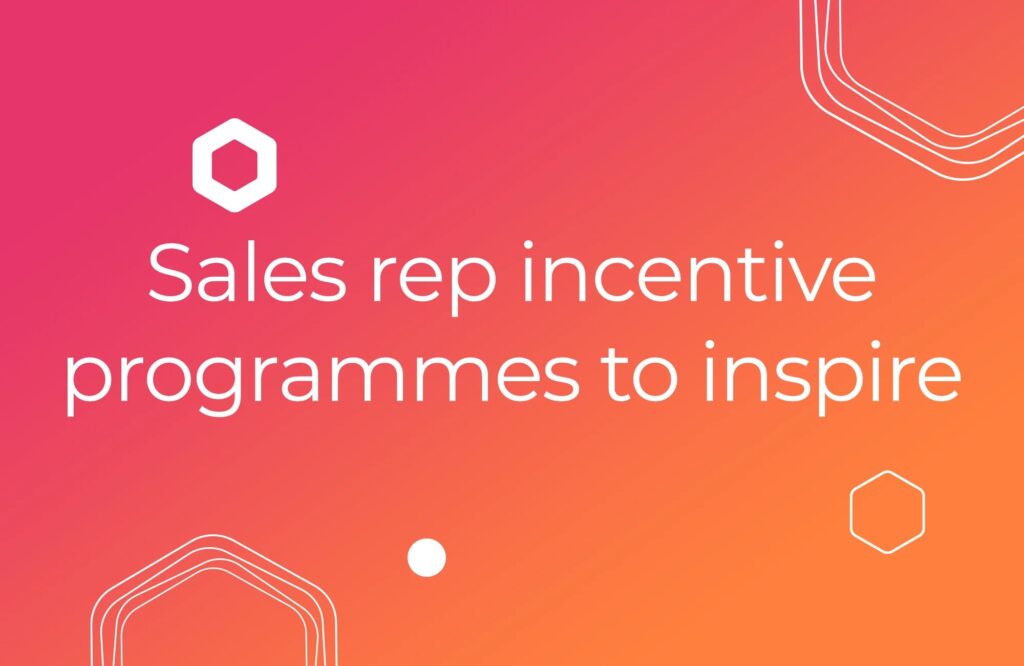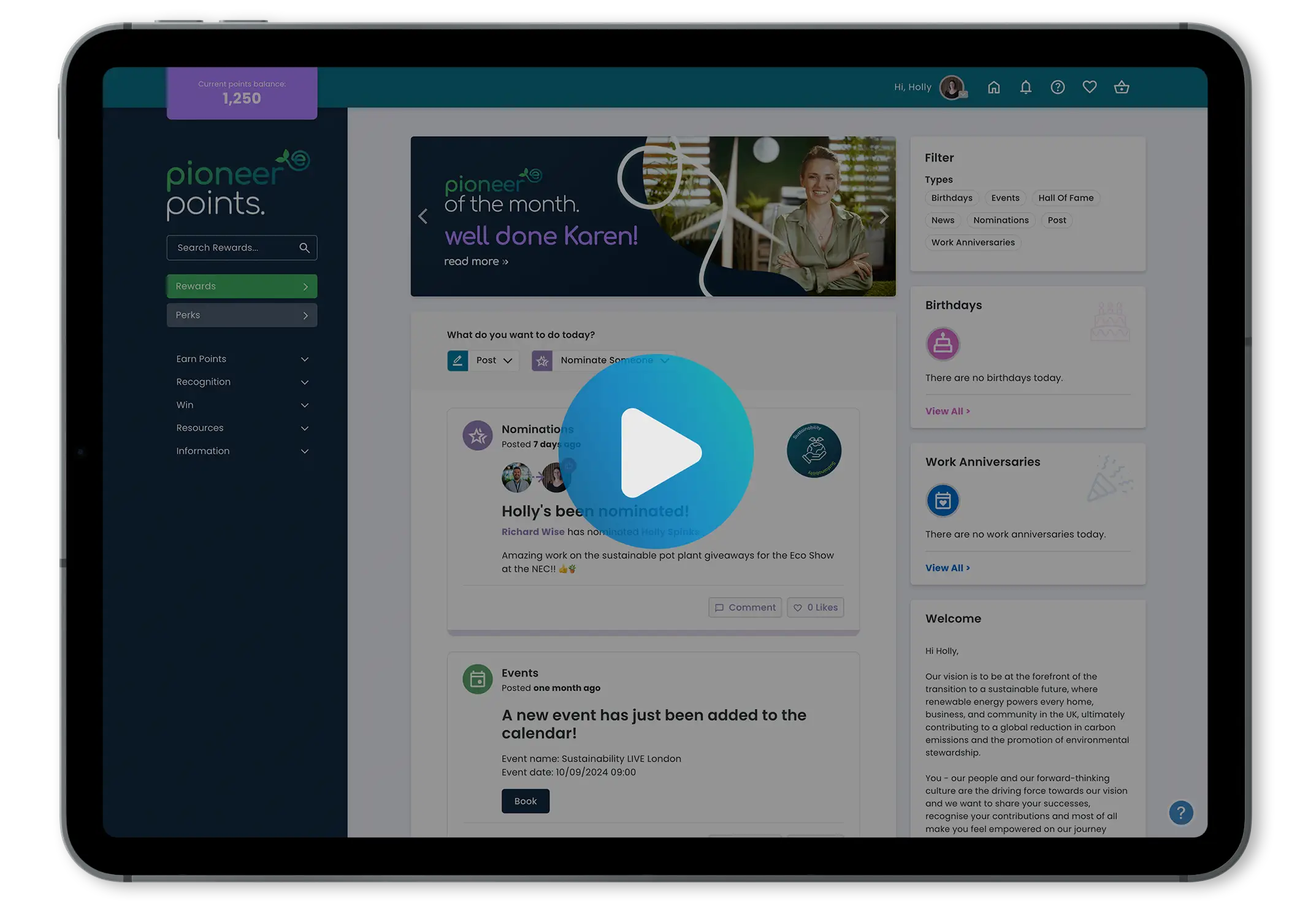


Guiding your sales team through the challenging terrain of sales management often calls for an infusion of creative, motivation-boosting incentives. If you’re a sales manager keen to push your team’s efforts to the next level, you’re most likely on the lookout for fresh sales rep incentive ideas to fuel those outbound efforts.
Below, we’ll not only explore some of the most effective sales rep incentive programmes but also delve into strategies aimed at boosting the performance of an underperforming sales team.
By implementing these tricks of the trade, you’ll be equipped to build a positive environment that propels your team toward outstanding results and sustained success.
Skip to:

Short-term incentives to encourage quick sales
Short-term incentives (often referred to as SPIFFs) are immediate and tangible rewards designed to motivate and boost the performance of sales teams in a brief timeframe. They’re particularly effective for driving immediate results and addressing specific performance objectives within a defined period.
Here are some examples of short-term incentives below:
 Monthly/Quarterly cash bonuses
Monthly/Quarterly cash bonuses
A cash bonus is a popular, immediate reward for individuals or teams that go above and beyond predetermined sales targets.
The straightforward structure of these bonuses creates a direct connection between a salesperson’s efforts and the end goal, which drives successful outcomes for meeting short-term objectives. The swift and direct delivery of cash bonuses is an incentive linked to high performance, as well as fostering healthy competition between the team.
 Commission boosts
Commission boosts
Offering commission boosts is the act of temporarily raising the percentage of commission that salespeople earn on their sales.
This strategic approach is designed to encourage salespeople to go the extra mile in closing deals within a specified timeframe. You could also link it to other organisational objectives if needed, such as promoting specific products or services, clearing excess inventory, or achieving sales targets within a particular market segment.
This short-term, limited-time commission offer prompts salespeople to intensify their efforts and explore new leads in a bid to maximise their earnings. In turn, they are likely to meet or exceed their sales targets.
 Recognition awards
Recognition awards
When hard work pays off, it’s only fair to acknowledge it.
Recognising top performers with awards (monthly, weekly and ad hoc as deserved) shows a direct appreciation to an employee who brings their best to the table.
Awards could be presented in rapid succession to the action taken that evoked the reward – this reinforces the positive behaviour.
They could take the form of non-financial congratulatory emails, certificates or plaques, serving as lasting reminders of the impactful contributions individuals make to the company. Or, you may wish to mention certain achievements on a more public scale, via the company website, ‘wall of fame’ or newsletter.
 Travel vouchers
Travel vouchers
Many sales professionals are caught up in the routine of being confined to same four office walls day after day. So, it’s no surprise that morale may drop over time. But by offering travel vouchers as an incentive, you’re providing the chance to escape into a completely different world for their hard efforts.
By hitting quarterly profit margins or making a certain number of sales, employees could earn vouchers to a destination of their choice – whether that be relaxing in the spa or navigating lively streets on a bustling city break. What makes this idea even more attractive is their flexibility – employees get to choose experiences that align with their personal preferences and get their partners involved.
Keep things affordable and proportionate when thinking short-term with day trips and weekend breaks, but also bear in mind that high-ticket-value long haul breaks also serve as an exceptional long-term motivator for year-end.
Ultimately, this incentive caters to the innate human craving for exploration, adventure, or pure relaxation. It sends a clear message that the company values and cares about the individual’s experiences beyond the confines of office walls.
 Self-care days
Self-care days
In the fast-paced world of sales, self-care is vital. They offer a vital respite from the intense and often stressful demands of the profession. Salespeople constantly have to deal with rejection and high-pressure scenarios, which can lead to burnout and mental fatigue.
Introducing self-care days provides sales teams with the chance to recharge, refocus, and alleviate stress. But it can also be a highly strategic move for the business. These much-needed pauses not only enhance wellbeing (which may contribute to fewer sick days) but also amplifies job performance as employees will be rested and raring to go again.
Long-term sales rep incentives
Long-term sales rep incentives are designed to motivate and drive the performance of a sales team over an extended period. Unlike short-term incentives that focus on immediate results, these rewards are aimed at fostering sustained success and engagement over months and years.
Here are a few examples of long-term incentives:
 Profit-sharing
Profit-sharing
Profit-sharing plans are like a mutual celebration of success within a company, where the business shares a slice of the company’s profits with employees.
Ultimately, when the company thrives, so do the employees. As the company grows and prospers over the years, employees participating in the programme enjoy the fruits of their hard work. It creates a positive loop – heightened efforts lead to increased profits, which, in turn, means more rewards for everyone involved.
It’s a genuine win-win scenario, fostering a sense of collaboration and collective achievement.
 Learning and development
Learning and development
Investing in learning and development opportunities serves as a dynamic and valuable incentive for sales professionals aiming to elevate their skills and career trajectory.
Rather than focusing solely on fun or financial rewards, organisations can give salespeople the opportunity for growth and improvement.
Improving product knowledge is essential, but be sure to also offer access to workshops, training sessions, and courses to equip reps with the tools to enhance their overall skill set. This will enable them to stay agile and adapt to industry changes effectively, ensuring they remain competitive and successful (during their time in your organisation and beyond).
As many salespeople are driven by the desire for career advancement, offering the incentive of regular promotions within the sales hierarchy provides the chance to handle more important accounts, lead teams and of course, earn a higher salary.
 Learning and development
Learning and development
Creating a supportive environment for the sales team to reach their full potential can involve implementing mentorship programmes for those who consistently excel.
This approach serves as a powerful motivator for individuals aspiring to maximise their achievements within the sales domain and provides a personalised, enriching experience beyond simply earning extra cash.
These mentorship initiatives establish a structured platform for one-on-one guidance, enabling sales professionals to benefit from personalised advice that is meticulously tailored to their unique strengths, weaknesses, and career aspirations.
Through regular interactions and constructive feedback, mentors instil confidence and inspire mentees to refine their skills, tackle complex sales scenarios, and navigate their career trajectories with purpose. In turn, employees will be better equipped to navigate workplace dynamics and build positive working relationships.

Fun incentives
Recognising that job satisfaction is crucial for sustaining employee commitment, fun incentives serve as more than just rewards—they become catalysts for a positive and motivating work atmosphere.
Here are a few examples of fun sales incentives you could implement tomorrow:
 Win a favour from the manager
Win a favour from the manager
Here’s an idea to add a personal touch to recognising your top salesperson: offer them a special favour directly from you!
To get started, set a clear timeline for the contest and let your team know about the prize options. At the end of the contest, the winner gets to choose a prize of their liking (within reason). It could be as simple as having you wash their car, completing a task you hate or taking them out for lunch at a restaurant of their choice. The key is to give them the freedom to choose something that aligns with their needs.
 Team experience days
Team experience days
The promise of a fun and engaging team experience serves as a motivational tool for sales teams. Knowing that their collective success will be celebrated with an exciting day of activities encourages employees to work collaboratively and strive for excellence. It also provides an opportunity to celebrate the achievement of collective sales goals or milestones – whether it’s reaching a quarterly target or surpassing a revenue milestone.
Some examples of team experience days may include:
- Outdoor adventure challenges (such as ropes courses, zip-lining, rock climbing, or obstacle courses.)
- Escape rooms
- Cooking classes
- Scavenger hunts
- Themed parties
- Wellness retreats
 Themed dress-up days
Themed dress-up days
Boost team spirit by introducing themed dress-up days as a dynamic incentive that’s sure to get everyone talking. This idea is sure to bring a sense of fun to the office, providing sales teams with an engaging opportunity to express their individuality and get to know their colleagues on a deeper level.
To make it even more of an exciting event, involve the team in the decision-making process by organising a themed vote. Whether it’s superhero capes and masks for “Superhero Day,” a nostalgic journey with “Throwback Thursday,” or a showcase of creativity with unconventional headwear on “Crazy Hat Friday,” the power to choose themes adds an inclusive element to this unique incentive.
What’s more, this type of activity allows sales teams to momentarily step away from the usual demands of their roles, which fosters stronger team bonding and a positive work culture.
How do you motivate an underperforming sales team?
Motivating an underperforming sales team requires a strategic and empathetic approach to reignite their drive. Identifying the root causes of underperformance, setting clear and achievable goals, and providing targeted training and development opportunities are essential steps.
Here’s a comprehensive step-by-step guide on how to overcome this issue:
Identify the route cause
Delving into the intricacies of underperformance requires a comprehensive exploration of the underlying factors that contribute to the team’s challenges. Identifying the root causes is not only an essential diagnostic step but also the linchpin for formulating effective and targeted solutions.
Some of the key issues may include:
- Skills gaps
- Unclear expectations
- Low morale ineffective processes
- Communication breakdowns
Set clear and achievable goals
Start by mapping out the big-picture objectives for the sales team. These goals should seamlessly connect with what the entire organisation is working toward, as well as outlining how the sales team are set to steer the company towards success.
It’s equally important to make sure these goals coincide with the team’s capabilities, as well as to each of the individual’s strengths and weaknesses. Remember, everyone on the team brings their unique skills and perspectives to the table. Avoid setting goals that seem too out of reach, as it will only lead to frustration and disappointment if the team constantly fails.
Take a closer look at the team’s past performance and the current market landscape, so that the goals set are both challenging enough to spark growth, but easy to hit in time.
Identifying and qualifying leads
Creating a formal system to figure out which potential customers are worth chasing is part and parcel of a successful sales strategy. Unfortunately, numerous teams encounter challenges in closing deals, often stemming from a lack of clarity or direction in their sales approach and therefore, miss out on valuable opportunities.
To fix this issue, you need to set up a systematic way to qualify potential customers, removing the guesswork to form a steady stream of potential deals in your sales pipeline.
Here’s how:
- Know your ideal customer: Identify exactly the type of person you need to sell to and inform your team of this too. Be sure to keep employees updated due to the ever-changing market.
- Capture leads: Develop a system, such as a website or social media strategy, to collect contact information from potential customers. This turns random calls into more promising leads.
- Use lead scores: Many CRM tools can help you quickly identify good prospects by analysing how people behave on your website and then, giving them a score based on certain criteria you set.
Re-frame the follow-up process
Establishing a well-documented follow-up process creates a roadmap for sales teams and eliminates the uncertainty about their next steps. Using a CRM platform can automate a significant portion of this process, offering timely reminders to your reps about who they need to reach out to and when. They also empower managers to meticulously track and analyse data related to the team’s accounts and pinpoint which follow-up strategies yield positive outcomes and those which fall short. By crafting transparent processes at each phase of the sales pipeline, your team has a much higher possibility of maintaining consistent performance and achieving their sales objectives.
Provide training and development
Offering consistent training and development opportunities is key to uplifting the performance of an underperforming sales team. Concentrate on workshops designed to enhance skills and impart knowledge in critical areas such as sales techniques, product expertise, and communication skills.
In the dynamic realm of sales, where change is constant, continuous learning will give you a competitive edge. Effective training serves as a fast-track, to ensure your team is in the loop with the latest industry trends, product updates, and the most innovative approaches to successful sales.

How do you increase sales rep morale?
When your sales rep’s morale is low, it can have cascading effects that impact both individual performance and the overall success of the team.
Low morale often leads to decreased motivation and a decline in productivity across the business. This, in turn, can result in missed sales targets and increased staff turnover, as disengaged team members are likely to seek new opportunities elsewhere.
However, there are key ways you can keep sales team morale high year-round, from offering flexible working arrangements to fostering a sense of fun in the office.
 Flexible work arrangements
Flexible work arrangements
Flexible work arrangements stand as a powerful tool in nurturing a positive work environment and boosting the morale of your sales team. Beyond the traditional nine-to-five structure, offering options such as remote work or flexible hours empowers sales representatives to take charge of their own work schedule to better suit their individual needs and preferences.
Remote work not only saves your team from the stress of daily commutes but also lets them set up their workspace exactly how they like it. Whether it’s from the comfort of their home or the buzz of a local coffee shop.
Flexible hours? This can be a total game-changer for employees with young families or personal commitments. Being able to choose work hours that fits around their lifestyle not only makes their job more manageable, but proves that the company cares about their health and wellbeing.
 Regular check-ins
Regular check-ins
Keeping in the loop with your sales team is the baseline of a healthy work culture.
It’s about fostering open lines of communication and showing that you’re not just a manager but a supportive ally on their professional journey. It’s a chance to dive into the challenges your sales reps are facing and address issues before they become roadblocks.
Beyond problem-solving, these check-ins serve as a platform to express authentic appreciation for their efforts. Sometimes, a simple “You’re doing great!” can be a morale booster, reinforcing the value of their contributions.
 Reflect on your attitude
Reflect on your attitude
Leadership is a constant influence that shapes team culture.
Negativity acts like a subtle toxin which can set the team’s morale and productivity on a downward spiral. It creates a ripple effect, creating an atmosphere that can stifle creativity and impede overall performance.
With this in mind, leaders should consciously make an effort to steer away from destructive expressions and instead, foster a positive narrative. This is where your role as a motivator comes into play.
By emphasising the potential for improvement and achievement, you inject a sense of purpose and optimism into the team dynamic. The bottom line is, to lead by example and act as a source of inspiration. Demonstrate resilience when challenges arise, as well as a genuine passion for the company’s mission to set the standard high from the get-go.
 Have fun
Have fun
Above all, it’s crucial that your sales team genuinely enjoys being at work. Therefore, don’t be afraid to inject some fun into the office!
In a high-pressure sales environment where stress and pressure are common, it becomes critical to introduce moments of enjoyment into the daily routine.
While traditional team-building events after-work certainly hold value, they often come with the drawback of infringing on personal time. Recognising this, a more effective and considerate strategy is to seamlessly integrate enjoyable activities into the regular workday. It sends a powerful message that success is not solely measured by meeting targets, but also by cultivating an environment where individuals feel relaxed and at ease in their environment and keen to take on new professional commitments.

Kickstart a new sales rep incentive programme today!
Initiating a new sales rep incentive programme is a strategic move that will propel your team toward success. By implementing any of the ideas mentioned above, you’ll not only foster healthy competition but also inspire your sales representatives to surpass their goals.
Taking the time to craft a well-thought-out strategy is the key to unlocking the full potential of incentives. So be sure to unlock this powerful tool for inspiring sales performance and constructing a happy, thriving sales team.



![How to inspire your sales team (and smash target!) {{ include_custom_fonts({"Poppins":["Semi Bold"]}) }}](https://no-cache.hubspot.com/cta/default/5921162/interactive-187541229676.png)





